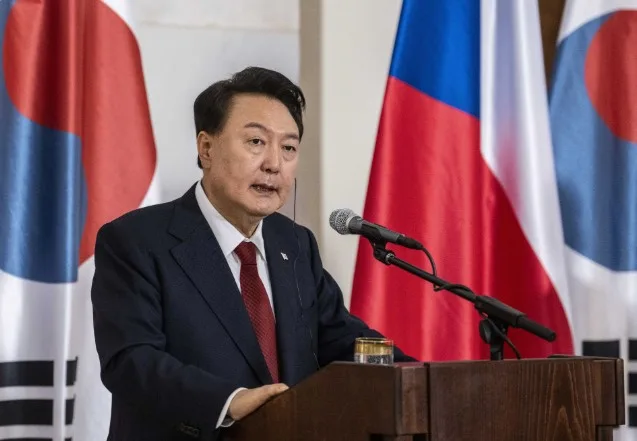South Korean President Yoon Suk Yeol declared martial law in a nationwide emergency address on Monday evening.
Seoul, South Korea – December 3, 2024 – South Korean President Yoon Suk Yeol declared martial law in a nationwide emergency address on Monday evening. The move comes after a series of violent protests and rising unrest across the country. In his address, President Yoon explained that the situation had reached a point where normal law enforcement was no longer enough to restore order.
The decision to impose martial law follows days of escalating protests, which began over economic difficulties, political tensions, and frustrations with government policies. Demonstrators have been calling for the resignation of President Yoon, blaming him for the country’s growing unemployment and inflation.
Reason for Martial Law
In his speech, President Yoon explained that the country was facing an “unprecedented crisis.” He said, “The violence and unrest have overwhelmed our security forces, and the government is no longer able to maintain public order.” The president emphasized that the declaration of martial law was necessary to protect the safety of citizens and preserve the stability of the nation.
Martial law gives the military the authority to replace civilian law enforcement, allowing for the deployment of troops in public spaces, curfews, and stricter controls on communication. President Yoon assured the public that the government would only use force as a last resort.
The government’s decision to impose martial law has been met with mixed reactions. Some citizens support the move, believing it is necessary to restore peace. Others, however, fear that it will lead to further violence and the suppression of political opposition.
Protests Sparked by Economic Struggles
The protests that led to the martial law declaration were sparked by frustration with the economy. South Korea has been dealing with high inflation and rising unemployment, which have created widespread dissatisfaction. Many citizens, especially younger people, are angry over the lack of job opportunities and high living costs.
Protesters have been demanding that President Yoon step down, accusing him of mismanaging the economy. The unrest quickly spread to cities across the country, with clashes between demonstrators and police. In some areas, protesters blocked streets, set fires, and clashed with law enforcement officers. The protests became increasingly violent, with reports of injuries on both sides.
The Military’s Role
Under the martial law order, the South Korean military will take over key security functions. The president said that troops would be deployed to areas with the most severe unrest. This includes major cities like Seoul, Busan, and Incheon. The military will assist police in controlling crowds and preventing further violence.
In addition to deploying troops, martial law gives the government the power to impose curfews in affected areas. The curfews will restrict people from going out at night, and violations could lead to arrests. Authorities also plan to monitor communications and limit the spread of information that might incite further unrest.
South Korea has not experienced martial law since the 1980s, when it was used during a period of political turmoil and military rule. The declaration now is seen as a drastic measure, given the country’s democratic history. However, President Yoon defended the decision, saying that it was necessary to protect the nation’s democracy and prevent chaos.
International Reaction
The international community has been watching closely as events unfold in South Korea. Foreign governments have expressed concern about the use of martial law and its potential impact on human rights. The United Nations has called for a peaceful resolution to the crisis, urging both the government and protesters to engage in dialogue.
“We are deeply concerned about the escalating violence and the impact on civilians,” said a spokesperson for the UN. “We urge all parties to exercise restraint and seek a peaceful way forward.”
The United States, a key ally of South Korea, has also expressed concern but reaffirmed its support for President Yoon’s government. U.S. Secretary of State Antony Blinken said that the U.S. would continue to monitor the situation and offer assistance if needed.
A Divided Public
The declaration of martial law has left the South Korean public deeply divided. While some citizens believe the military intervention is necessary to restore order, others fear it will lead to a crackdown on their rights. Protests are expected to continue in the coming days as both sides dig in their positions.
Opposition leaders have condemned the move, calling it an overreaction. They argue that the government should have focused on addressing the root causes of the protests, such as economic inequality and lack of job opportunities, rather than using force to suppress dissent.
In his speech, President Yoon assured the public that martial law would only be temporary. He promised that once order was restored, the military would withdraw, and the country would return to normal.





